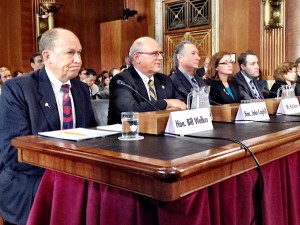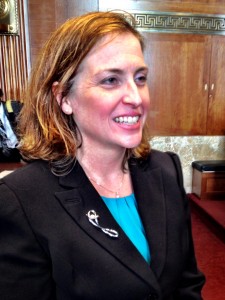
This week marks the 35th anniversary of a federal law that reshaped Alaska, literally redrew the map. It’s called the Alaska National Interest Lands Conservation Act. ANILCA created new preserves and refuges across the state. It nearly doubled the size of the National Park system. It also set policy on subsistence, mining, drilling and access to Alaska’s public land. It’s a complicated document that took years of negotiation. But at a congressional hearing today , Sen. Lisa Murkowski and Gov. Bill Walker said the feds aren’t living up to their end of the bargain.
Murkowski convened the hearing, as chairman of the Senate Energy and Natural Resources Committee. ANILCA, she says, set aside lands for conservation but was supposed to leave the rest available for development. Murkowski cited part of Jimmy Carter’s description of the final bill.
“’ One hundred percent of the offshore areas and 95 percent of the potentially productive mineral areas will be available for exploration and development,'” she read. “What a promise that was!”
Instead, the senator says, federal agencies have wrongly closed off more and more federal lands to development. Gov. Walker, one of the hearing witnesses, agrees.
“We haven’t gotten the benefit of the deal,” he said. “The deal was, it was a compromise and it was supposed to be balanced. And it hasn’t been. The ‘no more’ clause has not, has not been honored. We have not had the access that we should have had.”
The “no more” clause is a provision of ANILCA that says there are to be no more lands in Alaska withdrawn, unless Congress approves. It even bans certain studies of public lands in Alaska for more conservation. All but one of the invited witnesses agreed that federal agencies regularly violate this no-more promise. Some said the federal government is starving the trans-Alaska Pipeline of oil by, among other things, allowing rigs on only part of the National Petroleum Reserve. Walker says Alaska can’t afford to lose the pipeline.
“It would shut down Alaska. It would turn Alaska into something that we have not seen since prior to statehood,” he said. “And what a shame that would be because of – not a lack of resource – lack of access to the resource.”
State Sen. John Coghill, R-Fairbanks, brought up the BLM’s move to expand their “Areas of Critical Environmental Concern” in the Interior, which has alarmed gold miners in the Fortymile Mining District . Coghill says these ACEC designations aren’t allowed under ANILCA.
“They’re contrary to the law. They’re being used by the agencies to treat areas of critical concern with the idea of looking at wilderness characteristics,” Coghill testified. “It’s another withdrawal. It violates the ‘no more’ clause so significantly that it’s blatant.”
No one from the federal agencies was on the witness list. Murkowski said there wasn’t enough time for all who wanted to weigh in. But Valerie Brown, of the environmental law firm Trustees for Alaska, was on the panel. Brown says ANILCA has been a huge success, bringing the state tens of thousands of jobs in outdoor recreation and billions in consumer spending. Brown claims the other witnesses don’t understand what the “no more” clause really means.
“It says that there can’t be any more studies for the single purpose of creating a new conservation system unit in Alaska,” she said. “So that means we can’t go to unrestricted federal lands and say,  ‘We’d like a new national park here.’”
‘We’d like a new national park here.’”
But, Brown says, where the federal government has already “withdrawn” lands in parks and refuges and the like, the agencies still have to manage those lands and follow laws like the Federal Land Policy and Management Act. As for the “Areas of Critical Environmental Concern” – the ACECs Coghill spoke about — Brown argues the government’s plan to expand them IS legal.
“Those are required by law, they’re not withdrawals,” she said. “They’re the agency looking at all of its land and saying, ‘OK, under FLPMA we have to decide where the most critical habitat is and we’re going to designate an ACEC here.’ It’s not a withdrawal. It’s the still the same land designation and land withdrawal it was before.”
It was a busy day in Congress and Murkowski was the only senator present for most of the hearing.
Liz Ruskin is the Washington, D.C., correspondent at Alaska Public Media. Reach her at lruskin@alaskapublic.org. Read more about Liz here.





